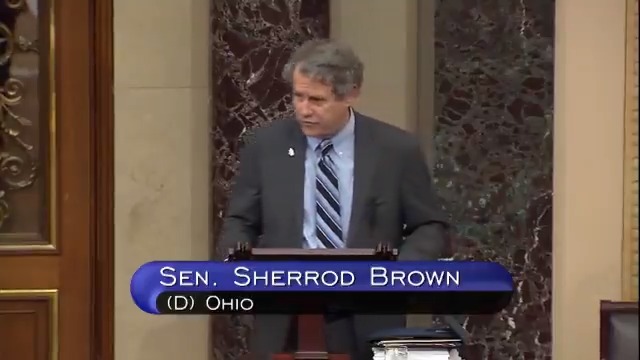Dem Senator Criticizes Congress for 'Not Doing Its Job of Redistributing Income'
Democratic Sen. Sherrod Brown of Ohio accused Congress this week of failing to do “its job to redistribute income” in the United States.
Speaking up during a Senate Banking Committee hearing Wednesday, according to the Washington Free Beacon, the prominent left-wing populist railed against his Republican colleagues, arguing the passage of Trump administration tax and budget cuts over the last three years had been a betrayal of the American people.
“[Senate Majority Leader Mitch] McConnell and [President Donald Trump] have refused to raise the minimum wage; it’s been stuck for 11 years at under eight dollars,” Brown said. “They took away overtime for about two or three million Americans because of truncating the overtime rule, tax cuts for the rich and now tax cuts for Medicare.”
“We know Congress isn’t doing its job to redistribute income in any way that’s fair to hundreds of millions of Americans,” he added. “We know that.”
Where Brown conceived this apparently manifest piece of knowledge, however, is incredibly unclear.
And all the more unclear is where this three-term U.S. senator conceived the idea that is the “job” of the Congress to redistribute wealth in this country, either in a fair manner or at all.
Perhaps my reading of the U.S. Constitution is wanting, but no matter how hard I squint, I cannot seem to find anywhere in the Article I establishment of the legislature a prescription for a federal body tasked with the termination or reduction of American wealth inequality.
What I can find is a bicameral legislature, elected to two- and six-year terms and responsible for everything from the declaration of war and the raising of armies to the coining of money and the levying of taxes, with each detail laid out explicitly and exclusively by the Founding Fathers as a power of the federal legislature.
Yet absolutely nowhere within that 2,266-word segment laying the foundation for the legislative branch can I find the authority or obligation to redistribute wealth.
Of course, such power may be read implicitly into the document’s preamble, which grants the whole of the three-pronged federal government the authority to “establish Justice, insure domestic Tranquility, provide for the common defence, promote the general Welfare, and secure the Blessings of Liberty.”
President Trump’s budget is his blueprint for how he wants to pay for his #GOPTaxScam - cutting Medicare, Medicaid, and Social Security.
378 people are talking about this
The top 1% owns about 40% of total household wealth. That's absurd.
There is a massive opportunity gap in this country. We need to address it.axios.com/income-inequal…
68 people are talking about this
But frankly, only a fool would wager that a delegation of merchants and militiamen willing to risk public execution in pursuit of freedom from tyranny would give to its ruling elite the obligation to compel or coerce great wealth from members of the general public in order to create equality of outcome.
Unfortunately, in many cases, that is exactly what we are dealing with: fools.
A seemingly ever-growing segment of the American population, blissfully unaware of the moral and philosophical grounds upon which the Revolutionary War was fought, has come to believe the role of government is that of a parent or a miracle worker.
Want to change the world? Become an educator, politician or activist.
At least that’s what America’s sons and daughters are being taught in our public schools.
And though I have no great hatred for the concept — in fact, I would rather like to see our politicians and educators care that they leave the world a better place than they found it — it is no small thing that the belief has grown so strong as to be used as justification for the removal of limitations on the government’s place and power in our society.
The fact that politicians like Brown would egg on such a shift in Americans’ understanding of the role of government is unsurprising, however.
Those in the seats of power are the only ones who truly stand to gain anything from a government with such a tyrannically large role.
They’re just hoping you’ll buy their pie-in-the-sky claims of economic equality and hand over the reins.




